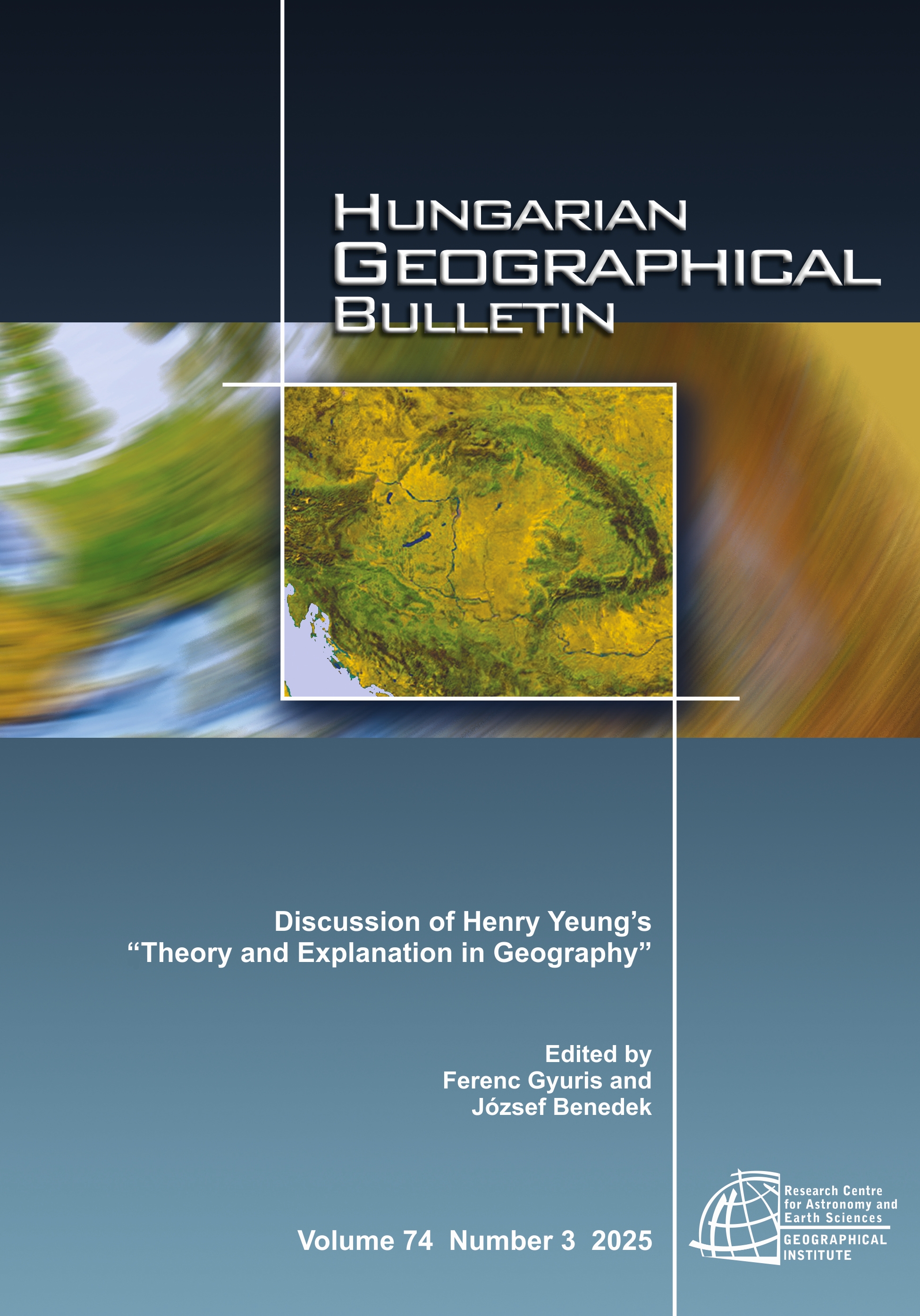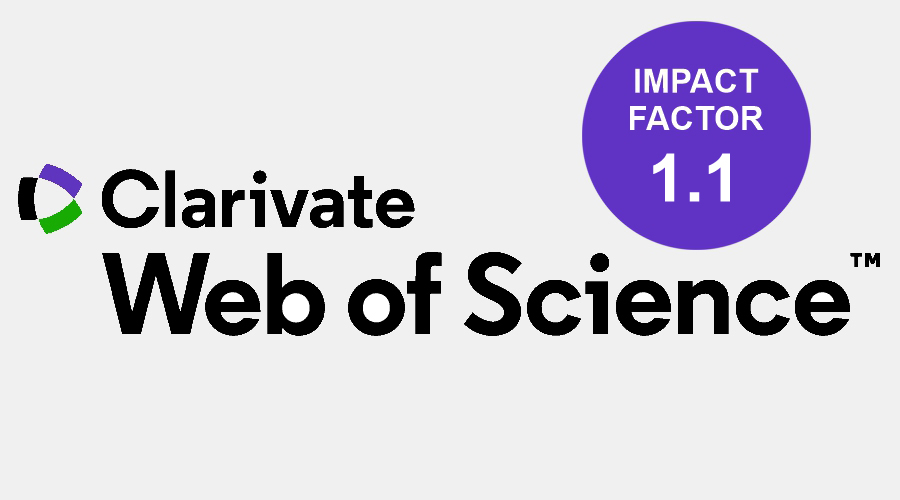Panel discussion of Henry Yeung’s Theory and Explanation in Geography
Abstract
This paper focuses on Henry Yeung’s recently published book with Wiley, Theory and Explanation in Geography, discussing it through the lens of an international group of scholars and from various perspectives. On the one hand, the current study aligns with the volume’s main message to create and apply mid-range explanatory theories in geography more intensively, rather than relying too heavily on theories imported from other disciplines, such as philosophy, which often overlook different geographical contexts and provide inadequate causal explanations. We also advocate for the conscious promotion of the internationalisation and decolonisation of geography through such theories. On the other hand, the paper examines the challenges and ambiguities of how geographers can become more self-reflective and philosophically educated to develop better theories, as well as how the history and philosophy of geography, as a subfield of the discipline, can contribute to this goal.
This study also scrutinises the relationship between proximity, scale, and causality, discusses the book’s major takeaways through a Central and Eastern European lens, and, even more broadly, analyses the structural shifts the volume and its referencing patterns indicate in the international practice of doing geographical research during the last half a century. By doing so, the article summarises the conclusions of a panel discussion held in November 2024 at Babeş-Bolyai University in Cluj-Napoca, Romania, the only book launch event of Theory and Explanation in Geography to have occurred so far in post-communist Central and Eastern Europe.
References
ABBOTT, A. 2016. Processual Sociology. Chicago, IL, University of Chicago Press. https://doi.org/10.7208/chicago/9780226336763.001.0001
BARNES, T., DOMOSH, M., JONES, J-P., MURPHY, A. and YEUNG, H.W. 2024. Yeung, H.W.: Theory and Explanation in Geography. A book review. Environment and Planning F 3. (3): 178–192. https://doi.org/10.1177/26349825241277609
BENEDEK, J. and ŢOIU, A. 2025. On the role of social-spatial context and new spatial technologies in Economic Geography. Hungarian Geographical Bulletin 74. (3): 285-299. https://doi.org/10.15201/hungeobull.74.3
BHASKAR, R. 2016. Enlightened Common Sense: The Philosophy of Critical Realism. Ed.: HARTWIG, M., London, Routledge. https://doi.org/10.4324/9781315542942
BLOMLEY, N. 2006. Uncritical critical geography? Progress in Human Geography 30. (1): 87–94. https://doi.org/10.1191/0309132506ph593pr
BLOMLEY, N. 2007. Critical geography: Anger and hope. Progress in Human Geography 31. (1): 53–65. https://doi.org/10.1177/0309132507073535
BLOMLEY, N. 2008. The spaces of critical geography. Progress in Human Geography 32. (2): 285–293. https://doi.org/10.1177/0309132507084401
BUTLER, J. 2015. Notes Toward a Performative Theory of Assembly. Cambridge, MA, Harvard University Press. https://doi.org/10.4159/9780674495548
COX, K.R. 2013. Notes on a brief encounter: critical realism, historical materialism and human geography. Dialogues in Human Geography 3. (1): 3–21. https://doi.org/10.1177/2043820613485041
DELEUZE, G. and GUATTARI, F. 1987. A Thousand Plateaus: Capitalism and Schizophrenia. Minneapolis, MN, University of Minnesota Press.
GREGORY, D. 1994. Geographical Imaginations. Cambridge, MA, Basil Blackwell.
GYURIS, F. 2025. Theory, explanation and references in geography: Comparing two seminal books by David Harvey and Henry Yeung. Hungarian Geographical Bulletin 74. (3). 269–284. https://doi.org/10.15201/hungeobull.74.3.3
HARTSHORNE, R. 1939. The Nature of Geography. Lancaster, PA, Association of American Geographers.
HARVEY, D. 1969. Explanation in Geography. London, Edward Arnold.
JAZEEL, T. 2019. Postcolonialism. London, Routledge. https://doi.org/10.4324/9781315559483
KORF, B. 2022. Schwierigkeiten mit der kritischen Geographie: Studien zu einer reflexiven Theorie der Gesellschaft (Difficulties with critical geography: Studies toward a reflexive theory of society). Bielefeld, transcript. https://doi.org/10.14361/9783839462300
MASSEY, D. and ALLEN, J. (eds.) 1984. Geography Matters! A Reader. Cambridge, Cambridge University Press.
MASSEY, D. 1994. Space, Place, and Gender. Minneapolis, MN, University of Minnesota Press.
MASSEY, D. 2005. For Space. London, Sage.
MERTON, R.K. 1968. Social Theory and Social Structure. New York, Free Press.
MILLER, H.J. 2004. Tobler’s first law and spatial analysis. Annals of the Association of American Geographers 94. (2): 284–289. https://doi.org/10.1111/j.1467-8306.2004.09402005.x
PEARL, J. 2009. Casuality. Models, Reasoning, and Inference. Second Edition. Cambridge, Cambridge University Press.
PEARL, J. and MACKENZIE, D. 2018. The Book of Why: The New Science of Cause and Effect. New York, Basic Books.
SAID, E.W. 2003. Orientalism: Western Conceptions of the Orient. Harmondsworth, Penguin.
SPIVAK, G.C. 1988. Can the subaltern speak? In Marxism and the Interpretation of Culture. Eds.: NELSON, C. and GROSSBERG, L., Basingstoke, Macmillan, 271–313.
SPIVAK, G.C. 1999. A Critique of Postcolonial Reason: Towards a History of the Vanishing Present. Cambridge, MA, Harvard University Press. https://doi.org/10.2307/j.ctvjsf541
THRIFT, N. 2021. Killer Cities, London, Sage. https://doi.org/10.4135/9781529752977
TOBLER, W.R. 1970. A Computer Movie Simulating Urban Growth in the Detroit Region. Economic Geography 46. Supplement: Proceedings, International Geographical Union. Commission on Quantitative Methods (June, 1970), 234–240. https://doi.org/10.2307/143141
WERLEN, B. 1987. Gesellschaft, Handlung und Raum (Society, action and space). Wiesbaden, Franz Steiner Verlag.
WERLEN, B. 1993. Society, Action and Space. An Alternative Human Geography. London, Routledge,
WERLEN, B. 1995. Sozialgeographie alltäglicher Regionalisierungen, Bd. 1: Zur Ontologie von Gesellschaft und Raum (The social geography of everyday regionalisation, Vol. 1: To the ontology of society and space). Stuttgart, Franz Steiner Verlag.
WERLEN, B. 1997. Sozialgeographie alltäglicher Regionalisierungen, Bd. 2: Globalisierung, Region and Regionalisierung (The social geography of everyday regionalisation, Vol. 2: Globalisation, region and regionalisation). Stuttgart, Franz Steiner Verlag.
WERLEN, B. (ed.) 2007. Sozialgeographie alltäglicher Regionalisierungen, Bd. 3: Ausgangspunkte und Befunde empirischer Forschung (The social geography of everyday regionalisation, Vol. 3: Starting points and findings of empirical research). Stuttgart, Franz Steiner Verlag.
YEUNG, H.W. 2001. Redressing the geographical bias in social science knowledge. Environment and Planning A 33. (1): 1–9. https://doi.org/10.1068/a33181
YEUNG, H.W. 2016. Strategic Coupling: East Asian Industrial Transformation in the New Global Economy. Ithaca, NY, Cornell University Press. https://doi.org/10.7591/9781501704277
YEUNG, H.W. 2024a. Method in relational-explanatory geography. Progress in Human Geography 48. (4): 391–420. https://doi.org/10.1177/03091325241248847
YEUNG, H.W. 2024b. Theory and Explanation in Geography. Hoboken, NJ, Wiley. https://doi.org/10.1002/9781119845515
YEUNG, H.W. 2025. Decentering Anglo-American Geography: theory development and “theorising back” from an Asian perspective. Asian Geographer 42. https://doi.org/10.1080/10225706.2025.2475624
Copyright (c) 2025 Henry Wai-chung Yeung, Paloma Puente Lozano, József Benedek, Andreea Țoiu, Ferenc Gyuris

This work is licensed under a Creative Commons Attribution-NonCommercial-NoDerivatives 4.0 International License.






